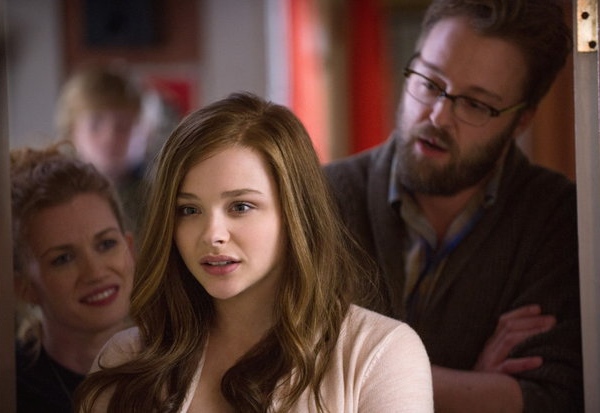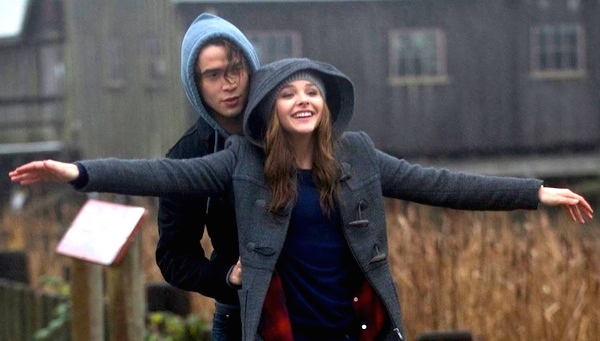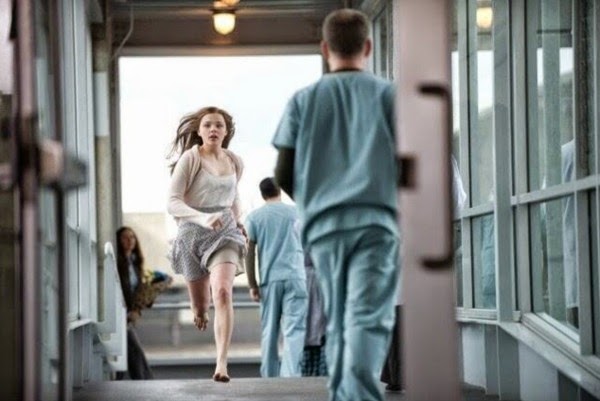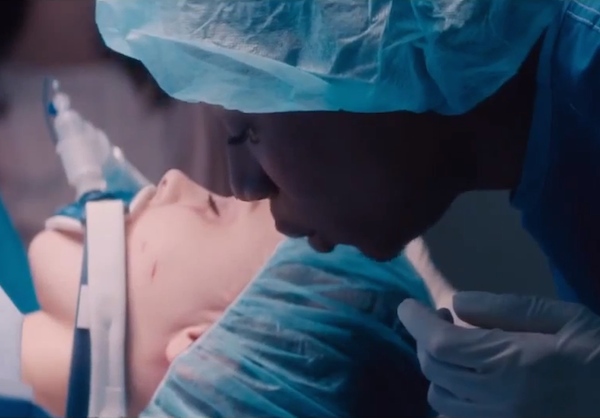If I Stay Review
"All the feels? Almost, but not quite."
Are dystopias a dying breed? Okay, probably not with two more
Hunger Games and at least three
Divergent sequels on the horizon. But there is something to be said about the recent surge of a different kind of YA dystopia at the box office this year: the ones where the reigning tyrants are just your parents and the terrifying, scenery-chewing villain is, well, death. They are everyday dystopias; miniature apocalypses teens could be facing on a weekly basis. They lose the fantastical and gain the gut-punch of realism in transition. And I want more of them.
The Fault In Our Stars was the first of this year’s realistic-skewing YA adaptations, and
we all pretty much agreed Josh Boone’s adaptation hit it out of the park. Now we have
If I Stay, a movie so determinedly sentimental and chock-full of snow-blasted landscapes and characters covered in seven layers of clothing, you kind of hate the powers that be for releasing it in the dog days of August. It’s not nearly as refined as "Fault", nor does it have that movie’s easygoing wit, but in its own lumbering, straight-faced way, it is just as effective in eking out a reason for us to truly care about the tragedy unfolding onscreen.

Based on the book by Gayle Forman, the film (directed by documentary filmmaker R.J. Cutler), like "Fault" before it, follows a near direct approach to adapting the author’s words for screen. Mia Hall is a cello prodigy who faces a crossroads of a decision when her family is in a head-on collision on an icy Oregon road. Finding herself in some sort of in-between state, she re-faces her past to decide whether to leave and be with her family beyond, or stay and face a turbulent life with her on-and-off boyfriend Adam and grieving grandparents.
Shauna Cross’s screenplay (she also wrote
Whip It) lives and dies on the decision to adapt Forman’s words verbatim, which can be awfully inconsistent. A scene between Mia and her father and some of his words of wisdom is well handled. As is what is arguably the best scene in the movie, between Mia’s grandfather, her comatose body, and her ghost-self. Both are very similar to those of the book, sometimes even sticking to Forman’s original words, and find huge success in the transition to the big screen.
But then you get moments like the opening scene, with its cheesy jokes and rushed-to-introduce family dynamics, or the sex scene with musical metaphors between Mia and Adam (thankfully truncated), both of which were horribly ham-fisted in the novel, and could have used some tweaks here for the film’s sake. Forman is a gifted writer, but, sorry to say, she’s no John Green, and her words as adapted for the screen come off as joyless and frivolous and lack that special spark, that acerbic energy that
Fault wholeheartedly benefited from.

Which leads to the film’s biggest problem: the structure. The trailers present it as a focus on Mia’s decision with intermittent flashbacks of her life. It’s actually the other way around: the flashbacks take up most of the run time, with occasional glimpses back to the present and a few scenes of Chloë Grace Moretz barreling through the hospital hallways. There’s a certain even predictability to the way the book plays out, one chapter as a flashback, one as a present day focus on Mia. In movie form, it all sort of comes off as
500 Days of Summer-lite. In the way the flashbacks appear out of order, with the present day frame narrative and the main character trying to remember things to help them make a decision.
All of that would be fine, the flashback heavy narrative and the awkward-at-times structure, if Mia’s decision were given more weight. But her motivations to live or die are never highlighted enough. We are shown how her and Adam met, how they fell in love, how they ran into trouble, how adorably cute her parents are, how her little brother changed their lives, etcetera. It’s a well-oiled machine in greasing the water-works of the audience because all the information comes after the fact. We learn how good of a mom and dad her parents were after they are already gone, and there’s a certain emotional heft to seeing that play out. But it is all a distraction from Mia’s emotional inner turmoil.

Even the central romance between Mia and Adam (Jamie Blackley) is believable, despite the inherent cheese factor early on (seriously what teenage boy talks like Adam does moments after meeting a girl for the first time?) But it all feels fruitless. This is a movie about tragedy, whose biggest tragedy happens while some people will still be walking into the theater, popcorn trailing behind. "Fault" works because there’s a constant, ever-present danger hanging over the protagonists, and everyone watching that movie sits in anticipation of the guillotine dropping. Even when Mia's decision begins to gravitate towards the death side of things, there's no dramatic tension in it. You know she won't do it. There’s a certain unspoken rule of tragedy in stories like this, and her choosing death just would not gel with the story being told.
But, despite this predictability, the movie works more often than it doesn't. Moretz is likeable as ever and fits nicely with Blackley’s Adam. Mireille Enos as rocker-chick-turned-mother is excellent, as is Joshua Leonard as Mia’s father. Stacy Keach as the previously mentioned grandfather gets most of the best, emotionally resonant scenes of the entire movie, despite having a thinly drawn character who is only trotted out for tragedy's sake. His awful, gut-clenching stutters in attempting to successfully explain to Mia’s comatose body that despite what everyone wants, it would be okay if she chose to leave, is earth-shatteringly sad. And right up there with Gus’ pre-funeral.

Really, in the end,
If I Stay is a bit of a family epic. Mia’s memories flashback to her childhood and the first time she touched a cello, to chilling shots of her mother and father holding her little brother, to Sunday get-togethers where their Portland home turned into an epic pot-luck. Cutler uses really interesting choices in some of these moments, especially where quick glimpses into her past are just still, time-frozen shots of her family, cut and edited into a dream-like whirl-wind of moments that are sometimes more effective than the actual stretched-out backstory flashbacks.
And really, that’s this movie’s biggest success: a believable family unit. Seeing the life these people led, knowing where they all end up, is heartbreaking again and again. The movie is billed as a sort of less fantastical version of
The Lovely Bones, but it’s less about confusing afterlife metaphors and more concerned with the down-and-dirty problems of every day living. Like how a rift forms between the two leads because Mia hates going to Adam’s shows, or Mia's dilemma of choosing Juilliard over being with Adam, or Enos quietly remarking "We made that" as her and Leonard listen to a young Mia play the cello into the dead of night.
It may sound particularly boring, but, despite my previous grievances on the flashback heavy structure, there’s a certain beauty to its decision to focus on the mundane over the fantastical. It’s not a great movie, it’s a bit overlong and does not give the film’s main dramatic conflict near enough focus, but it does give the realistic YA tradition began by
The Fault In Our Stars earlier this summer a hefty push in the right direction.
Pros
- Moretz as likable a lead as ever
- Any scene between Keach and Moretz
- Like the book, has some masterfully well-tuned scenes of high emotion
Cons
- Also like the book, has some confusingly handled moments of pure awkward cheese
- Mia's conflict could have used much more focus
- Heavily reliant on narration
- Weird, soft-focused fuzziness to some scenes
- Pretty predictable
 Based on the book by Gayle Forman, the film (directed by documentary filmmaker R.J. Cutler), like "Fault" before it, follows a near direct approach to adapting the author’s words for screen. Mia Hall is a cello prodigy who faces a crossroads of a decision when her family is in a head-on collision on an icy Oregon road. Finding herself in some sort of in-between state, she re-faces her past to decide whether to leave and be with her family beyond, or stay and face a turbulent life with her on-and-off boyfriend Adam and grieving grandparents.
Shauna Cross’s screenplay (she also wrote Whip It) lives and dies on the decision to adapt Forman’s words verbatim, which can be awfully inconsistent. A scene between Mia and her father and some of his words of wisdom is well handled. As is what is arguably the best scene in the movie, between Mia’s grandfather, her comatose body, and her ghost-self. Both are very similar to those of the book, sometimes even sticking to Forman’s original words, and find huge success in the transition to the big screen.
But then you get moments like the opening scene, with its cheesy jokes and rushed-to-introduce family dynamics, or the sex scene with musical metaphors between Mia and Adam (thankfully truncated), both of which were horribly ham-fisted in the novel, and could have used some tweaks here for the film’s sake. Forman is a gifted writer, but, sorry to say, she’s no John Green, and her words as adapted for the screen come off as joyless and frivolous and lack that special spark, that acerbic energy that Fault wholeheartedly benefited from.
Based on the book by Gayle Forman, the film (directed by documentary filmmaker R.J. Cutler), like "Fault" before it, follows a near direct approach to adapting the author’s words for screen. Mia Hall is a cello prodigy who faces a crossroads of a decision when her family is in a head-on collision on an icy Oregon road. Finding herself in some sort of in-between state, she re-faces her past to decide whether to leave and be with her family beyond, or stay and face a turbulent life with her on-and-off boyfriend Adam and grieving grandparents.
Shauna Cross’s screenplay (she also wrote Whip It) lives and dies on the decision to adapt Forman’s words verbatim, which can be awfully inconsistent. A scene between Mia and her father and some of his words of wisdom is well handled. As is what is arguably the best scene in the movie, between Mia’s grandfather, her comatose body, and her ghost-self. Both are very similar to those of the book, sometimes even sticking to Forman’s original words, and find huge success in the transition to the big screen.
But then you get moments like the opening scene, with its cheesy jokes and rushed-to-introduce family dynamics, or the sex scene with musical metaphors between Mia and Adam (thankfully truncated), both of which were horribly ham-fisted in the novel, and could have used some tweaks here for the film’s sake. Forman is a gifted writer, but, sorry to say, she’s no John Green, and her words as adapted for the screen come off as joyless and frivolous and lack that special spark, that acerbic energy that Fault wholeheartedly benefited from.
 Which leads to the film’s biggest problem: the structure. The trailers present it as a focus on Mia’s decision with intermittent flashbacks of her life. It’s actually the other way around: the flashbacks take up most of the run time, with occasional glimpses back to the present and a few scenes of Chloë Grace Moretz barreling through the hospital hallways. There’s a certain even predictability to the way the book plays out, one chapter as a flashback, one as a present day focus on Mia. In movie form, it all sort of comes off as 500 Days of Summer-lite. In the way the flashbacks appear out of order, with the present day frame narrative and the main character trying to remember things to help them make a decision.
All of that would be fine, the flashback heavy narrative and the awkward-at-times structure, if Mia’s decision were given more weight. But her motivations to live or die are never highlighted enough. We are shown how her and Adam met, how they fell in love, how they ran into trouble, how adorably cute her parents are, how her little brother changed their lives, etcetera. It’s a well-oiled machine in greasing the water-works of the audience because all the information comes after the fact. We learn how good of a mom and dad her parents were after they are already gone, and there’s a certain emotional heft to seeing that play out. But it is all a distraction from Mia’s emotional inner turmoil.
Which leads to the film’s biggest problem: the structure. The trailers present it as a focus on Mia’s decision with intermittent flashbacks of her life. It’s actually the other way around: the flashbacks take up most of the run time, with occasional glimpses back to the present and a few scenes of Chloë Grace Moretz barreling through the hospital hallways. There’s a certain even predictability to the way the book plays out, one chapter as a flashback, one as a present day focus on Mia. In movie form, it all sort of comes off as 500 Days of Summer-lite. In the way the flashbacks appear out of order, with the present day frame narrative and the main character trying to remember things to help them make a decision.
All of that would be fine, the flashback heavy narrative and the awkward-at-times structure, if Mia’s decision were given more weight. But her motivations to live or die are never highlighted enough. We are shown how her and Adam met, how they fell in love, how they ran into trouble, how adorably cute her parents are, how her little brother changed their lives, etcetera. It’s a well-oiled machine in greasing the water-works of the audience because all the information comes after the fact. We learn how good of a mom and dad her parents were after they are already gone, and there’s a certain emotional heft to seeing that play out. But it is all a distraction from Mia’s emotional inner turmoil.
 Even the central romance between Mia and Adam (Jamie Blackley) is believable, despite the inherent cheese factor early on (seriously what teenage boy talks like Adam does moments after meeting a girl for the first time?) But it all feels fruitless. This is a movie about tragedy, whose biggest tragedy happens while some people will still be walking into the theater, popcorn trailing behind. "Fault" works because there’s a constant, ever-present danger hanging over the protagonists, and everyone watching that movie sits in anticipation of the guillotine dropping. Even when Mia's decision begins to gravitate towards the death side of things, there's no dramatic tension in it. You know she won't do it. There’s a certain unspoken rule of tragedy in stories like this, and her choosing death just would not gel with the story being told.
But, despite this predictability, the movie works more often than it doesn't. Moretz is likeable as ever and fits nicely with Blackley’s Adam. Mireille Enos as rocker-chick-turned-mother is excellent, as is Joshua Leonard as Mia’s father. Stacy Keach as the previously mentioned grandfather gets most of the best, emotionally resonant scenes of the entire movie, despite having a thinly drawn character who is only trotted out for tragedy's sake. His awful, gut-clenching stutters in attempting to successfully explain to Mia’s comatose body that despite what everyone wants, it would be okay if she chose to leave, is earth-shatteringly sad. And right up there with Gus’ pre-funeral.
Even the central romance between Mia and Adam (Jamie Blackley) is believable, despite the inherent cheese factor early on (seriously what teenage boy talks like Adam does moments after meeting a girl for the first time?) But it all feels fruitless. This is a movie about tragedy, whose biggest tragedy happens while some people will still be walking into the theater, popcorn trailing behind. "Fault" works because there’s a constant, ever-present danger hanging over the protagonists, and everyone watching that movie sits in anticipation of the guillotine dropping. Even when Mia's decision begins to gravitate towards the death side of things, there's no dramatic tension in it. You know she won't do it. There’s a certain unspoken rule of tragedy in stories like this, and her choosing death just would not gel with the story being told.
But, despite this predictability, the movie works more often than it doesn't. Moretz is likeable as ever and fits nicely with Blackley’s Adam. Mireille Enos as rocker-chick-turned-mother is excellent, as is Joshua Leonard as Mia’s father. Stacy Keach as the previously mentioned grandfather gets most of the best, emotionally resonant scenes of the entire movie, despite having a thinly drawn character who is only trotted out for tragedy's sake. His awful, gut-clenching stutters in attempting to successfully explain to Mia’s comatose body that despite what everyone wants, it would be okay if she chose to leave, is earth-shatteringly sad. And right up there with Gus’ pre-funeral.
 Really, in the end, If I Stay is a bit of a family epic. Mia’s memories flashback to her childhood and the first time she touched a cello, to chilling shots of her mother and father holding her little brother, to Sunday get-togethers where their Portland home turned into an epic pot-luck. Cutler uses really interesting choices in some of these moments, especially where quick glimpses into her past are just still, time-frozen shots of her family, cut and edited into a dream-like whirl-wind of moments that are sometimes more effective than the actual stretched-out backstory flashbacks.
And really, that’s this movie’s biggest success: a believable family unit. Seeing the life these people led, knowing where they all end up, is heartbreaking again and again. The movie is billed as a sort of less fantastical version of The Lovely Bones, but it’s less about confusing afterlife metaphors and more concerned with the down-and-dirty problems of every day living. Like how a rift forms between the two leads because Mia hates going to Adam’s shows, or Mia's dilemma of choosing Juilliard over being with Adam, or Enos quietly remarking "We made that" as her and Leonard listen to a young Mia play the cello into the dead of night.
It may sound particularly boring, but, despite my previous grievances on the flashback heavy structure, there’s a certain beauty to its decision to focus on the mundane over the fantastical. It’s not a great movie, it’s a bit overlong and does not give the film’s main dramatic conflict near enough focus, but it does give the realistic YA tradition began by The Fault In Our Stars earlier this summer a hefty push in the right direction.
Really, in the end, If I Stay is a bit of a family epic. Mia’s memories flashback to her childhood and the first time she touched a cello, to chilling shots of her mother and father holding her little brother, to Sunday get-togethers where their Portland home turned into an epic pot-luck. Cutler uses really interesting choices in some of these moments, especially where quick glimpses into her past are just still, time-frozen shots of her family, cut and edited into a dream-like whirl-wind of moments that are sometimes more effective than the actual stretched-out backstory flashbacks.
And really, that’s this movie’s biggest success: a believable family unit. Seeing the life these people led, knowing where they all end up, is heartbreaking again and again. The movie is billed as a sort of less fantastical version of The Lovely Bones, but it’s less about confusing afterlife metaphors and more concerned with the down-and-dirty problems of every day living. Like how a rift forms between the two leads because Mia hates going to Adam’s shows, or Mia's dilemma of choosing Juilliard over being with Adam, or Enos quietly remarking "We made that" as her and Leonard listen to a young Mia play the cello into the dead of night.
It may sound particularly boring, but, despite my previous grievances on the flashback heavy structure, there’s a certain beauty to its decision to focus on the mundane over the fantastical. It’s not a great movie, it’s a bit overlong and does not give the film’s main dramatic conflict near enough focus, but it does give the realistic YA tradition began by The Fault In Our Stars earlier this summer a hefty push in the right direction.